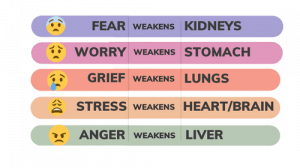
Emotions Affecting Organs
Emotions and Organs in Chinese Medicine
The relationship between emotions affecting organs is well-known in traditional Chinese medicine and functional medicine. Emotional stress is frequently linked to physical trauma to the body.
Although stress is known for causing illness in the body, it is also vital since it triggers our sympathetic (fight-or-flight) response when we are faced with frightening circumstances. Of course, there is a world of difference between remembering to reply to that urgent email and fleeing from a predator.
Today, however, our stress response to routine duties can become just as heightened as if our lives were in danger, which makes the body more prone to illness. Living constantly in survival mode without an internal sense of safety or an “off-switch” can be the deciding factor in how quickly feelings and experiences turn into physical illnesses.
The Different Kinds of Stress
Stress comes in various forms, each impacting our body differently:
- Physical stress: This includes things like an injury or accident.
- Chemical stress: Includes things like exposure to chemicals in the environment.
- Hormone imbalances: This includes changes in blood sugar levels.
- Emotional tension: Which can be more or less noticeable depending on whether we recognise and process our emotions or repress them and let them linger.
- Eustress: A healthy stress that triggers the body to heal, act in a non-damaging manner and set off vital functional pathways for health in the mind and body. BUT, there is a fine line between eustress and dis-stress.
Understanding the Impact of Emotions on Organ Health in Traditional Chinese Medicine
Traditional Chinese Medicine (TCM) has always been aware of how emotional stress affects the body, but it goes a step further to make this connection. Each emotion has an associated internal organ, and when an emotion is too strong, it interferes with the organ’s capacity to do its role. This is due to the different, yet predictable effects that each emotion has on the flow and direction of energy (Qi) throughout the body.
Emotions are neither “good” nor “bad”; they are all normal and healthy. They can, however, be moderate, repressed, or excessive. In TCM and functional medicine, an emotion can manifest in the body as physical symptoms linked to its corresponding internal organ when it is suppressed, experienced repeatedly, unbalanced, or inappropriately used.
Emotions and Organs Chart

Emotions and Organs of the Body
ANGER: Affects the Liver, Eyes, & Gallbladder
Anger covers emotions like irritation, jealousy, and hostility, impacting the liver, eyes, and gallbladder. The liver, whose primary function is to maintain a steady flow of qi and blood throughout the body, is impacted by anger. Additionally, it retains blood, which is crucial for women to have a pain-free, regular cycle. Along with the eyes, the liver also shows strength in the tendons, hair, and nails. Whether anger is suppressed or expressed externally, such as by shouting, will determine how it affects the body. In general, anger results in the Liver Qi stagnating and festering, which impairs circulation and/or produces internal “heat” (think: redness, a rising dynamic, agitation).
Liver or anger imbalance symptoms can cause:
- Aggressive or abusive outbursts
- Erratic moods
- Depression
- Red eyes and a face
- Dizziness
- Dry mouth
- High blood pressure, dizziness
- Waking between 1 to 3 a.m.
- Headaches
- Stiff shoulders and neck
- Tendonitis
- PMS & Excruciating Period Cramps
FEAR: Affects the Kidneys, Bladder, & Ears
Chronic anxiety, insecurity, or trauma are absent factors that give rise to fear. It also has a connection to lack of willpower and loneliness.
Kidney function is impacted by fear (and Adrenal Glands which are considered one system in TCM). Our “life gate” is said to be the kidneys. They provide comparable functions to the thyroid.
The kidneys are like the batteries in our bodies, to use a metaphor. They control our everyday stress response and energy levels as well as our longevity, growth and development, metabolism, temperature regulation, and fertility. Additionally, they manifest themselves in the ears, teeth, and low back.
It is not surprising that the kidneys control fear because, according to biomedicine, the adrenal glands release cortisol and norepinephrine when we are exposed to danger, stress, and significant life changes. In the end, fear weakens the kidneys, which causes the Qi to drop.
A kidney or fear imbalance can cause the following symptoms:
- Urinating frequently and incontinence
- Hot flushes and night time sweats
- Bad memory
- Knee and low back pain
- Ringing in the ears
- Loss of hearing
- Early aging plus hair loss
- Infertility
- Osteoporosis
SADNESS: Affects the Lungs, the Skin, & the Large Intestine
Sadness is claimed to be strongly related to feelings of nostalgia, regret, grief, sadness, and emotional suffering.
Sadness has an impact on the lungs, which are responsible for breathing, producing and transferring qi throughout the body, controlling sweat glands, and maintaining internal and external barriers, as demonstrated by a strong immune system. Sadness eventually weakens the Lungs and lets the Qi go.
Lung or sadness imbalance symptoms can cause:
- Chest tightness
- Breathing difficulty
- Hay fever and asthma
- Having frequent illness
- Eczema, dry skin, etc.
- 3 to 5 a.m. awakening
- Crying easily and often
When the Lungs are influenced for a long enough period of time, it can directly affect the Large Intestine, which is the paired Yang organ and causes problems with disposal (Constipation, IBS, IBD, Ulcerative Colitis, etc.)
WORRY: Affects the Spleen, Stomach, & Pancreas
One of the most prevalent emotions is worry, which might include fixating on things, obsessing on them, persistent anxiety and engaging in intensely focused mental tasks.
Worry largely affects the spleen, which is responsible for blood formation and management, nutritional absorption, food digestion, and energy production.
The spleen, especially in women, affects the frequency and volume of monthly blood loss, which is a key factor in maintaining a regular menstrual cycle. The mouth and lips are linked to the spleen, which also controls the body’s “sinews” and muscles. Worry weakens the spleen and makes the chi “knotted” and stuck.
A spleen or worry imbalance can cause the following symptoms:
- Persistent exhaustion
- Reduced appetite
- Digestive issues and bloating
- Constipation or diarrhea
- Easily bruising; bleeding issues
- Heavy/Long Periods
SHOCK: Affects the Gallbladder
A sudden emotional response to anything that is present is referred to as shock, and it is connected to trauma, horror, fright, and being startled.
Although shock can be connected to joy and impact the Heart, it is more directly related to fright and consequently the Gallbladder, which in TCM serves primarily as a storage organ for the bile produced by the Liver. Its path travels up the side of the torso, around the back of the shoulders, and up the side (temporal region) of the head. These bodily parts may experience symptoms if they are impacted. Making decisions, having courage, and using good judgment are all much easier when the gallbladder is emotionally balanced. The Qi disperses when one is shocked.
A gallbladder or shock imbalance can cause the following symptoms:
- Timidity (startled easily)
- Problems with fatty foods and any oils taken internally (except essential oils)
- Decision-making difficulty
- Unpleasant aftertaste
- Consecutive headaches
- Having trouble digesting food
- Shoulder ache or rib pain
- Constipation (floating or pale stools too)
- Gallbladder stones
JOY: Affects Heart Health
All emotions are felt by the Heart, but Joy is the one that is most directly related. Joy can also be used to describe being overexcited.
The heart’s job is to regulate the body’s blood vessels and itself, keeping a steady and even pulse. Our health and consciousness are intertwined with the heart. The tip of the tongue, complexion, and arteries are indicators of heart health. The Qi’s flow is slowed and relaxed by joy.
A Heart or Joy imbalance might cause the following symptoms:
- Palpitations
- Restlessness
- Insomnia
- Nightmares
- Mania
STRESS: Affects Heart & Brain Health
As discussed above stress has a powerful effect on the body and can cause a whole heap of problems if it continues for long periods of time. When you are stressed pathogens have a bit too much fun in your body and can go a bit too wild which can lead to lots of symptoms and illnesses physically and mentally.
The difference between Traditional Chinese medicine, Functional Medicine and Traditional Medicine
Both Chinese medicine and functional medicine have similar approaches and place a strong emphasis on the need to treat the disease’s underlying causes rather than just its symptoms. Acupuncture and tai chi are used in Chinese medicine to encourage the flow of qi (energy) through the channel, as well as medications and food to assist the healing process last longer.
Dietary and lifestyle modifications are used in functional medicine to treat patients. Also, the diagnostic methods are different in the two medical traditions. Chinese medicine utilises non-invasive procedures to diagnose patients, including feeling the pulse and looking at the tongue, whereas functional medicine uses more invasive methods, like taking blood and fluid samples.
Functional medicine and Chinese medicine treats the root cause of immunological, autoimmune, inflammatory, hormonal, and other reactions, including fibromyalgia and chronic fatigue syndrome.
The traditional types of medical healthcare practitioners will wait for symptoms to occur and then provide medication to hide the pain or symptom to make it easier to deal with, but not necessarily get rid of it altogether so it stops happening.
At Wholistic Natural Health, we treat our clients with various methods and protocols such as functional medicine, the PNEI of Trauma, result based coaching, and also as all of these responses above can also be intensified by microbial imbalances in the body we also use testing methods such as integrative pathology services through Nutripath.
We constantly take into account how a patient’s emotions are affecting their physical health and vice versa. We frequently observe the connections and indicators mentioned above and make it a point to gently bring them to the patient’s attention so that processing and self-healing can take place.
We hope you enjoyed this blog on Emotions Affecting Organs. Let us know what you think in the comments section below or if you would like to know more information about how Functional medicine works, feel free to get in touch with us.



